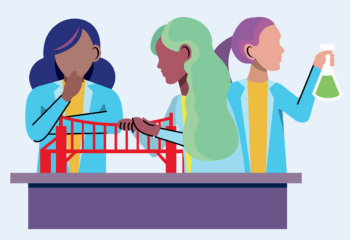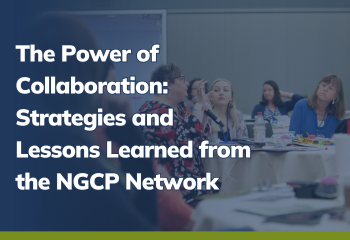The National Girls Collaborative Project (NGCP) organized and held a national convening on Tuesday, September 26, 2023, at the New America offices in Washington, DC, to bring together thought leaders for a candid conversation on the persistent issues facing girls and women in STEM. The purpose of these conversations was to create an action agenda for accelerating solutions to make real progress related to girls’ and women’s representation and experiences in STEM. Participants agreed that while there are a significant number of activities, programs, and initiatives focused on increasing girls’ and women’s participation in the STEM workforce, we have yet to see a significant shift in the landscape.
Throughout the meeting, the following themes emerged: the importance of centering girls’ voices and valuing girls’ unique experiences, learning from existing efforts rather than reinventing the wheel, connecting diverse sectors through collaboration, shifting the dialogue about STEM to focus on inspiring curiosity in STEM and changing the messaging about math, and acknowledging the important role corporations play in community engagement.
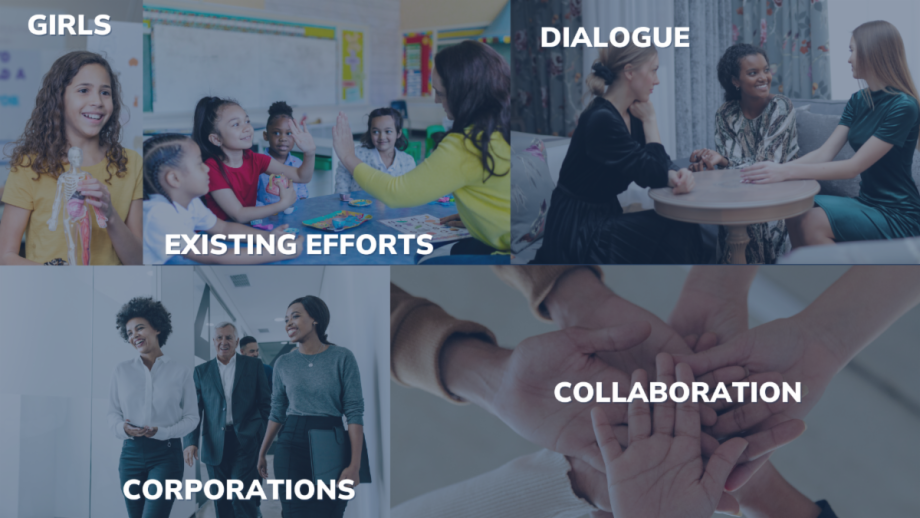

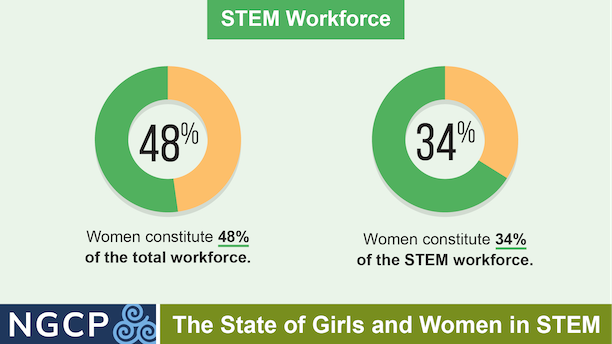
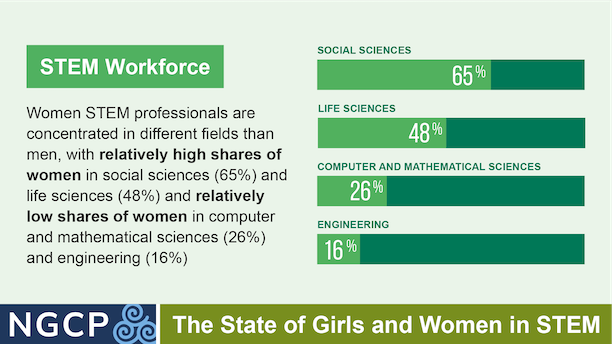
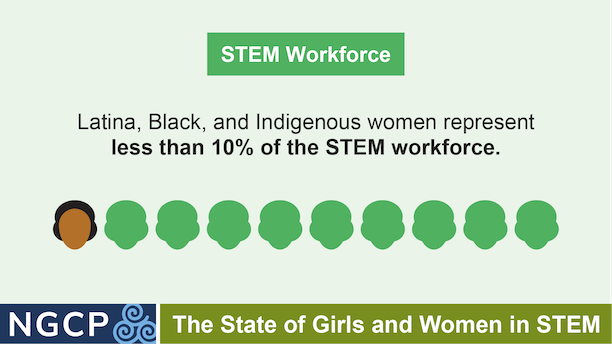
Recommendations
While it is critical to focus efforts on K-12 and post-secondary education to engage and encourage girls and young women in STEM, there is also a need for women to have STEM workplaces where they feel they have a sense of community. Research has identified potential barriers for women entering STEM professions that need to be addressed, including persistent STEM stereotypes, gender bias and discrimination, lack of support and opportunities for advancement, and negative workplace culture (Ganley, George, Cimpian, & Makowski, 2018; Hamrita, Hall, Fling, & Mendoza, 2023; Pew Research Center, 2018; Thébaud & Charles, 2018). Recommendation #1 focuses on creating a program to acknowledge STEM corporations and businesses to motivate STEM workplaces to invest in recruiting and retaining women employees and sustain a positive workplace culture.
Bringing together STEM corporations with educational efforts can positively impact both sectors, and these partnerships are crucial in influencing the systems that affect girls and women in STEM. There are models for fostering partnerships between the K-12 field and corporations to learn from rather than inventing something new. Recommendation #2 focuses on building the capacity of corporations to collaborate with and support K-12 STEM education efforts by empowering them with research and data on gender equity in STEM, including the barriers to and strategies for engaging girls in STEM.
For decades, researchers and policymakers have relied on the “STEM pipeline” metaphor to illustrate the trajectory from PK-12 education into a STEM degree or career. Despite criticism, it has persisted as the dominant model when examining issues of diversity, equity, and inclusion in STEM. There is a need for a new way of thinking, a new model to replace this problematic metaphor and approach for understanding girls' and women’s trajectories through PK-12 education and into the STEM workforce. Recommendation #3 focuses on developing a new model to be rooted in ecological systems theory (Bronfenbrenner, 1979), adaptations of this theory, and current STEM ecosystems work to provide a comprehensive way of thinking about connected pathways and understanding all the complex influences on girls and women pursuing STEM.
It is critical to center and listen to girls’ voices to position them at the front of our efforts and allow them to lead the movement to increase gender equity in STEM. Research on and with girls and young women has greatly increased over the past two decades and can help us understand their perspectives and lived experiences. Recommendation #4 focuses on developing and disseminating a comprehensive report that summarizes existing research that amplifies girls' and young women’s voices and includes additional data that addresses gaps in our knowledge related to girls' and young women’s STEM engagement.
While there are numerous initiatives, programs, and resources available to connect with and learn from related to gender equity in STEM, there is no one place to find all this information. Recommendation #5 focuses on creating an online clearinghouse related to gender equity in STEM to facilitate the sharing of knowledge and discourage the duplication of efforts.
The State of Girls in STEM Executive Summary
Download the executive summary below.
The State of Girls in STEM Complete Report
Download the complete report below.
Acknowledgements
The event was a true collaborative endeavor and would not have been possible without the contributions of the following individuals who helped in multiple ways, from initial brainstorming of the idea to developing the agenda and providing support and assistance during the event.
- Melissa Ballard, Association of Science and Technology Centers
- Tricia Berry, The University of Texas at Austin
- Margaret Black, Lyda Hill Philanthropies
- Chloe Callahan, Qualcomm
- An-Me Chung, New America
- Janet Cinfio, Acxiom
- Nikole Collins-Puri, Techbridge Girls
- Siobahn Day Grady, North Carolina Central University
- Teresa Drew, STEM Next
- Ruthe Farmer, Last Mile Education Fund
- Anne Fertitta, AMD
- Gabriela A. González, CihuaTEC Connect
- Ashley Huderson, U.S. Department of Education
- Julie Lata, Applied Materials
- Mary Murrin, Chevron
- Daisy Navarro, Student
- Abi Olukeye, Smart Girls HQ
- Esther Owolabi, Google
- Markita Riley, Society of Women Engineers
- Shihadah Saleem, New York Hall of Science
- Lucy Sanders, National Center for Women & Information Technology
- Kimberly Scott, Arizona State University
- Julie Shannan, Big Mission Consulting
- Meeta Sharma-Holt, Sharma-Holt Consulting
- Alayna Smith, Ewing Marion Kauffman Foundation
- Denaya Smith, Student
- Michael Smith, The PEER Group
- Debra Sterling, GoldieBlox
- Jennifer Stimpson, T.D. Jakes Foundation
- Michele Walker-Moak, Applied Materials
- Gina Warner, National Afterschool Association
- Naomi Wilson, Student
- Imogene Winkleman, Girls Scouts of the USA
- Shane Woods, Girlstart
Related Resources
State of Girls and Women in STEM
Created annually by NGCP, this resource presents a high-level summary of the most compelling statistics and research on the state of girls and women in STEM, focused on K-12 Education, Higher
The Power of Collaboration: Strategies and Lessons Learned from the NGCP Network
Apply research-based collaboration strategies to enhance your science, technology, engineering and math (STEM) activities and programs.

